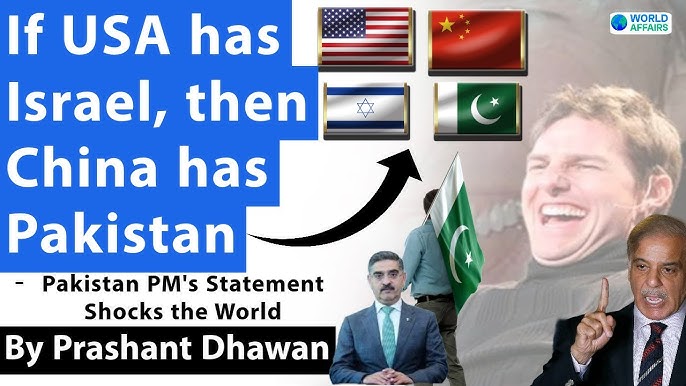
Introduction
People often compare the strategic partnership between Pakistan and China to the relationship between Israel and the United States. Both alliances are deeply rooted in geopolitical interests, military cooperation, and economic collaboration. While the dynamics differ, the fundamental premise remains the same: a powerful nation backing a key regional ally to maintain influence and counterbalance adversaries.
Historical Context of Alliances
Pakistan-China Relations
Pakistan and China established diplomatic ties in 1951, but their strategic relationship deepened after the 1962 Sino-Indian War. Facing a common regional rival in India, China and Pakistan developed a close military and economic partnership. Over the years, China has supported Pakistan in military advancements, infrastructure projects, and international diplomacy. The China-Pakistan Economic Corridor (CPEC), a flagship project under China’s Belt and Road Initiative (BRI), further cemented their economic interdependence.

Chinese General Xiong Guangkai once remarked, “Pakistan is China’s Israel,” emphasizing the strategic depth of the Sino-Pakistan alliance. This statement reflects China’s view of Pakistan as a crucial regional partner, akin to how the United States sees Israel.
Israel-United States Relations
The United States first recognized Israel in 1948 and has since been its strongest supporter. The relationship intensified during the Cold War, as Israel served as a crucial ally against Soviet-backed regimes in the Middle East. The U.S. provides Israel with substantial military aid, advanced weaponry, and political backing in international forums. In return, Israel supports U.S. interests in the region, often acting as an extension of American influence.
Military Cooperation and Arms Support
China’s Role in Strengthening Pakistan’s Military
China has been Pakistan’s primary defense supplier, equipping it with fighter jets, naval assets, and nuclear technology. The joint development of the JF-17 Thunder fighter jet exemplifies this cooperation. Additionally, China has provided Pakistan with advanced missile systems, submarines, and space technology. The two nations also engage in extensive military exercises, reinforcing their strategic partnership.
U.S. Military Support to Israel
The United States provides Israel with over $3.8 billion in annual military aid, ensuring Israel maintains a qualitative military edge over its adversaries. The U.S. has supplied Israel with cutting-edge defense systems, including the Iron Dome, F-35 fighter jets, and precision-guided munitions. Additionally, both countries engage in intelligence sharing and joint military drills, strengthening their operational synergy.
Economic and Infrastructure Investments
China’s Economic Influence in Pakistan
China’s economic investments in Pakistan have transformed the nation’s infrastructure and energy sector. The CPEC, worth over $60 billion, has led to the construction of highways, railways, and power plants. This initiative has bolstered Pakistan’s economy and provided China with strategic access to the Arabian Sea, strengthening its regional presence.
U.S. Economic Assistance to Israel
The U.S. has been instrumental in Israel’s economic prosperity, supporting its technological and defense industries. Israel benefits from free trade agreements, preferential military contracts, and research collaborations with American institutions. The U.S. also plays a pivotal role in securing international funding for Israeli projects.
Diplomatic Backing on the Global Stage
China’s Support for Pakistan in International Forums
China has consistently defended Pakistan on global platforms, particularly in the United Nations. It has blocked attempts to designate Pakistan as a state sponsor of terrorism and has shielded its ally from diplomatic isolation. Additionally, China’s influence on organizations like BRICS and the Shanghai Cooperation Organisation (SCO) enhances Pakistan’s global standing.
U.S. Advocacy for Israel in the UN and Beyond
The United States is Israel’s strongest advocate in the United Nations, often using its veto power to prevent resolutions against Israel. Washington has also facilitated multiple peace deals involving Israel and Arab nations, strengthening Israel’s diplomatic ties worldwide. Furthermore, the U.S. ensures Israel’s security interests remain a priority in international negotiations.

Counterbalancing Regional Rivals
Pakistan and China’s Strategy Against India
The Pakistan-China alliance primarily aims to counterbalance India’s growing regional influence. China supports Pakistan militarily and economically to ensure India remains preoccupied with its western neighbor. Additionally, China and Pakistan collaborate on diplomatic strategies to curb India’s ambitions in international forums.
Israel and the U.S. Containing Middle Eastern Threats
Israel and the U.S. work closely to counter threats from Iran and other adversarial forces in the Middle East. The U.S. supplies Israel with intelligence and military support to deter Iranian expansionism and terrorist groups like Hezbollah and Hamas. This cooperation ensures Israel remains dominant in the region.
Differences Between the Two Alliances
While the Pakistan-China and Israel-U.S. relationships share similarities, they also have key differences. The U.S.-Israel alliance is rooted in historical, cultural, and political ties, whereas China and Pakistan primarily share a strategic and economic partnership. Additionally, Israel enjoys bipartisan support in the U.S., whereas China’s support for Pakistan is often transactional and driven by geopolitical calculations.
Conclusion
The Pakistan-China and Israel-U.S. alliances are of paramount importance to global geopolitics. While Pakistan relies on China for military and economic support, Israel enjoys unwavering backing from the United States. Both alliances protect their respective interests by acting as counterweights to regional powers. As global dynamics shift, these strategic partnerships will continue to influence international relations in profound ways.
References:
- China-Pakistan Economic Corridor (CPEC) Overview—Belt and Road Initiative
- U.S. Military Aid to Israel—Congressional Research Service
- Pakistan-China Defense Cooperation—Defense News
- U.S.-Israel Relations—U.S. State Department
- China’s Role in Pakistan’s Nuclear Program—Carnegie Endowment for International Peace
- Pakistan Denies J-35A Deal, But Delivery Appears Imminent
- China plans to arm Pakistan with DF-17 hypersonic missiles.







